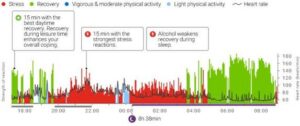Hitting the gym or training hard is a great way to relieve stress, release endorphins and make you feel better.
However, there are times when smashing your session could actually be causing your body negative damage, increasing your stress levels and affecting your ability to recovery, and deal with life’s stress.
Experts from Firstbeat, leaders in advanced performance analytics, explain why it’s sometimes best to rest.
“Heavy exercise taxes the body, with very intense exercise causing cortisol (the stress hormone) levels to rise significantly, studies show.” says Tiina Hoffman, Exercise Physiologist and Master Trainer for Firstbeat.
“The heart will also be beating fast, blood pressure will be elevated and rapid breathing will all tax the cardiovascular system. Under normal conditions; with sufficient food, sleep, hydration and rest – these are all perfectly fine for most individuals. However, there are times when this could cause problems to individual well-being.”
· If you’ve had a very stressful day
Heavy exercise further stresses the body, elevating the heart rate significantly and even releasing more cortisol, the stress hormone.
Long term elevated cortisol can lead to lower immune function and bone density, increased weight gain, blood pressure, cholesterol, and heart disease.
Heavy exercise late into the evening can also affect your body’s ability to slow down into ‘restore mode’, meaning you won’t be able to recover as much overnight.
Easy exercise, such as a light evening walk or stretching, is usually a much better alternative after a stressful day – this also will help to prepare you for a good night’s sleep.
· Hungover / Before a drinking session
After a heavy night out, your sleep quality will be seriously compromised. “Just having as little as one unit of alcohol in your system at bedtime can delay the onset of restorative sleep by around one hour.
Having just two large glasses of wine (approximately 6 units) late in the evening and sleeping for six hours means you may not get any restorative sleep at all, and therefore won’t recover overnight.” says Nigel Stockill, Performance Director at Firstbeat.
The general stress level of the body and the heart will also be high as it is dealing with removing the toxic alcohol. So, after a big night out you should definitely skip that heavy workout.

· Terrible night’s sleep
If you have slept poorly, you will not be recovered. In most cases it is best to skip the heavy session, focus on your pre-bed routine and get a solid night’s sleep and workout the next day.
Some people may still wish to train, but it is important to consider lowering the intensity and focus on getting a good sleep the following night.
· If you have done heavy gym sessions the previous days
Heavy training sessions really take their toll on the Central Nervous System. If you have taxed the CNS severely the previous few days, it may be best to rest if you are tired, sore and not feeling 100%.
Even if it is in your diary to train your legs, it is important to listen to your body and adjust the training plan if needed, e.g. if your body is sore or very fatigued after previous training.
Firstbeat experts ensure hundreds of thousands of athletes worldwide keep performing at their best.
The Lifestyle Assessment, offered direct and through partners and providers, offers a snapshot of your lifestyle and how your body reacts to stressors, and how it recovers.
